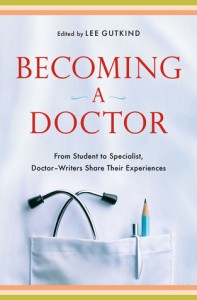Recently, s[r] posted Julie Matsen’s review of Becoming a Doctor: From Student to Speciaist, Doctor-Wrtiers Share Their Experiences by Lee Gutkind.
 The overwhelming importance of storytelling in the medical field is reflected in Becoming a Doctor, within which we see what goes into the formation of a doctor. Perhaps I should not phrase it like that: Lee Gutkind, the editor of this anthology, describes doctors not as extraordinary people, but as “ordinary people engaged in an extraordinary profession.”
The overwhelming importance of storytelling in the medical field is reflected in Becoming a Doctor, within which we see what goes into the formation of a doctor. Perhaps I should not phrase it like that: Lee Gutkind, the editor of this anthology, describes doctors not as extraordinary people, but as “ordinary people engaged in an extraordinary profession.”
The anthology begins with Sayantani DasGupta’s description of the almost maniacal intern who hoards everything she can, from pens to patients and from scented soaps to dreamless sleep. Danielle Ofri describes the chasm between the sheer beauty of her dance classes and the agony associated with her patients during her second year of residency at Bellevue. Average resident Chris Stookey describes the dubious distinction of being the first in his residency class to be successfully sued for medical malpractice. Seasoned pediatrician Perri Klass, who has a son in medical school, encourages her students to pay close attention to the remarkable privilege that is getting to know a patient. With Thomas C. Gibbs, we see the magic behind a doctor’s hands. “If not me, then who,” geriatric specialist Zaldy S. Tan asks, will care for patients like his aging grandmother, who are only going to get more numerous as Baby Boomers get older? William Carlos Williams, another “American physician who happened to write,” is resuscitated by Robert Coles, who was inspired to become a doctor by his experiences with Dr. Williams.
Some may see the formation of a doctor as we see the creation of their trademark white lab coats, as something that can be formulated and documented. X number of years are spent as an undergrad, Y number in graduate school, Z number in residency. But a doctor’s calling is an inherently human profession, and is thus so much more than the sum of the parts. It is made of more than the student loans, the (hopefully occasional) lawsuits, and the long hours. It is more than the cries of agonized patients, the helpless hand-wringing in the family room. Postmortem, a doctor’s actions can be dissected with all of the clarity of hindsight, and we must proceed with the understanding (as Marion Bishop puts it) that becoming a doctor is a matter of supporting someone in an all-too-human way.
You can read our interview with Lee Gutkind in Issue 1.
- Contributor Update Paula Cisewski - April 15, 2024
- Meet the Poetry Contributors for Issue 33 - April 11, 2024
- Honey by Victor Lodato: Contributor Update - April 10, 2024